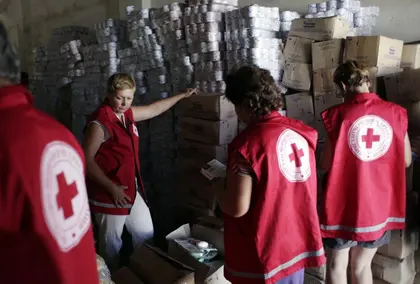The Ukrainian Red Cross Society says it started its own investigation into the alleged wrongdoing at the beginning of January, prior to the airing of Hromadske’s program. The spokeswoman for the society’s Kyiv office, Anastasia Solianyk, told the Kyiv Post that as parts of the program were filmed with a hidden camera, they cannot confirm how many of the individuals involved were volunteers or employees.
The International Red Cross is a separate organization.
JOIN US ON TELEGRAM
Follow our coverage of the war on the @Kyivpost_official.
Among the items sold by members of staff at offices in the Vyshgorod and Desnianskyi districts of the capital were cosmetics and hygiene products donated by multinational Proctor and Gamble. The products that were sold has a price range of Hr 10-200 (41 U.S. cents to $8.25), according to Slidstvo’s investigation.
One Ukrainian Red Cross honorary donor, Svitlana Solianyk, was even caught selling donated chocolate on the street. She told the undercover journalists that if they wanted more they simply had to ring the Red Cross.
Slidstvo was first alerted to the illegal activities by volunteers Maria Isaeva and Oleksiy Yarylchenko, among others, who had worked at the Kyiv office and who said they were asked to help sell the products. Their managers at the organization called it “charity selling” but Isaeva and Yarylchenko said it wasn’t clear where the money from the sales was going.
The volunteers told the journalists that they had tried to speak to the head of the organization in Kyiv, Alla Khabarova, but though she had agreed the practice was corrupt, it seemed that she had failed to take action to prevent it.
Another money-making scheme appears to be charging for first aid classes, which are officially free. Regional offices across Ukraine were asking attendees for a “charitable contribution” of between Hr 300 and Hr 400 ($12.40 to $16.50), Slidstvo found.
The Ukrainian Red Cross Society received Hr 365 million from the state budget between 2013 and 2016, according to documents from the Ukrainian Ministry of Health.
The journalists decided to investigate the regional offices of the Ukrainian Red Cross Society too, working on the assumption that if such things could happen at the head office in Kyiv, the situation elsewhere could be similar.
In Odesa, Slidstvo met Swiss businessman Max Hilpert, who is married to a Ukrainian and has been living in the city for 25 years. Prior to the war, Max and his wife Yulia helped hospitals, but when the war began they put all their efforts into helping Ukrainian soldiers. With donations from Switzerland, the couple bought large quantities of medical equipment and clothing, according to Oleksiy Galyuk, the head of the Southern Military Medical Supplies Center.
For customs purposes, as well as the fact that he is Swiss, Hilpert chose to cooperate with the Red Cross to import and transport the equipment across the country.
But according to Hilpert, not all of the aid reached its destination.
The head of the Odesa Red Cross, Tamara Barnych, told Slidstvo that she had provided all the documents to Hilpert, and the organization had the right to dispose of the aid as they saw fit.
Further digging by Slidstvo journalists found that the Southern Military Medical Supplies Center was missing nearly 2,500 x-ray bandages and 2,000 sweaters.
The Dnipropetrovsk Military Hospital, which is the first major hospital near the front, was short of 200 stretchers, 200 sweaters, 36 mattresses and 300 blankets.
Hilpert’s lawyer, Anatoly Grabov, said that Barnych is obstructing the police investigation, an allegation that spokesperson at the Odesa regional police Andriy Kostyuk confirmed. Barnych denies that the police have asked for any documents.
The investigation also discovered that the head of the Zaporizhia branch, Konstantyn Sylyn, was guilty of killing a woman in his car. Sylyn, however, avoided being imprisoned for manslaughter and paid the family compensation instead. Slidstvo.info also found that he had been a member of the Party of Regions, according to party records, which is strictly prohibited by the Red Cross, which pledges to be politically impartial.
Khabarova, the head of the Ukrainian Red Cross, told Slidstvo that she didn’t recognize the honorary donor they had filmed, despite her having had this status for over 10 years, and denied that the volunteers had approached her. However, later in the interview she admitted that an investigation had been conducted and the people involved had been punished. With regards to the head of the Zaporizhia office, she said that the killing had been “regrettable” but denied he had been involved in politics while working for the Red Cross.
The following day after the airing of Slidstvo’s investigation, on Jan. 14, the Red Cross Society made an official statement on their website regarding the program.
“After volunteers alerted Kyiv’s rapid reaction unit in November 2015, the National Committee of Societies has been conducting a selective audit of the Kyiv city organization. At the end of December 2015, after meeting with the leadership of the Kyiv city organization and the heads of regional organizations, it was decided that a comprehensive review would be conducted in January 2016. As was planned, the work has started.”
The statement further thanked the journalists for bringing the matter to their attention and said that it would be “examined in detail”. Along with the results of an audit commission, appropriate action will be taken, the statement read.
Kyiv Post staff writer Isobel Koshiw can be reached at [email protected]
You can also highlight the text and press Ctrl + Enter




